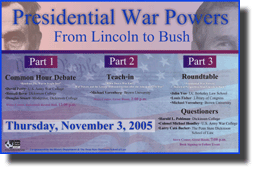Admiral Dennis Blair
Omar Bradley Chair
Tuesday, September 18, 2007
7:00 p.m. – Stern Center, Great Room
The American Use of Military Force Since the Fall of the Berlin Wall
When the Berlin Wall came down in 1989 there were hopes for a peaceful new world order and even predictions of the end of history. As it turned out, the United States has sent major military forces into action nine times in the 19 years since then. Two major conflicts are continuing today in Afghanistan and Iraq. Admiral Blair will address how the United States has used military force in recent years, successfully and unsuccessfully, and how to think about what the country should do in Afghanistan and Iraq. Co-sponsored by the department of political science.
Issue in Context
The fall of the Berlin Wall in 1989 marked the end of nearly a half-century of Cold War between the United States and the Soviet Union. The United States emerged victorious, affirming its superiority in the international arena. President H. W. Bush declared grand expectations for a “new world order” – the United States would finally be able to fulfill its founding fathers’ visions of freedom. There were widespread hopes for global peace. However, Read more


